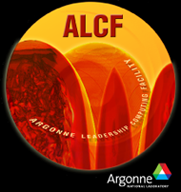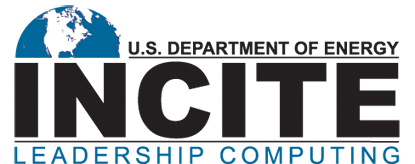ASCR Leadership Computing Challenge (ALCC)
Call Information
|
Eligibility: |
Available to researchers from universities, industry, and government agencies DOE sponsorship is not required. |
|
Award Size: |
Small-medium |
|
Duration: |
1 year (renewable) |
|
Allocation Cycle: |
July 1, 2025 – June 30, 2026 |
|
Pre-proposals Due: |
Monday November 11, 2024, at 8:00 PM ET |
|
Pre-proposal Decision: |
Monday December 16, 2024 |
|
Proposals Due: |
Monday February 10, 2025, at 8:00 PM ET |
|
Proposal Decision: |
Late May |
The ASCR Leadership Computing Challenge (ALCC) is an allocation program for projects of interest to the Department of Energy (DOE), with an emphasis on high-risk, high-payoff scientific campaigns enabled via high-performance computing (HPC) in areas directly related to the DOE mission, that respond to national emergencies, or that broaden the community of researchers capable of using leadership computing resources.
ALCC is currently soliciting proposals for allocation awards for the 2025-2026 allocation year. High performance computing (HPC) platforms available for the current allocation cycle include Frontier, the exascale system at the Oak Ridge Leadership Computing Facility (OLCF); Aurora, the new exascale system at the Argonne Leadership Computing Facility (ALCF); Polaris, a 44-petaflop accelerated system at ALCF; and Perlmutter, an accelerated system at the National Energy Research Scientific Computing Center (NERSC). 10% to 30% of the allocatable computing time will be made available on each of these machines to the ALCC program.
Important Policies:
- Allocation Request Cap: To ensure equitable distribution of projects, any pre-proposal or proposal that requests more than the stated maximum request limit will be deemed non-responsive and will not be reviewed. For more information, please see Allocation Request Cap Information.
- Mid-year Allocation Reduction: On January 19, 2026, a percentage of unused allocation hours will be returned to the ALCC program for redistribution to other projects. For more information, please see Allocation Reduction Information.
Overview:
Open to scientists from the research community in industry, academia, and national laboratories, the ALCC program allocates from 10% to 30% of the computational resources at ASCR’s three high performance computing facilities: NERSC at Lawrence Berkeley National Laboratory and the Leadership Computing Facilities at Argonne and Oak Ridge National Laboratories. These resources represent some of the world’s fastest and most powerful supercomputers.
ALCC is one of several allocation programs for ASCR supercomputing facilities (see ASCR Allocation Policy) and supports ASCR’s efforts to further DOE mission science, respond to National emergencies, or to broaden community access to leadership computing facilities. To fulfill its goal of broadening community access, ALCC supports a range of project allocation sizes and allocates time across all three ASCR supercomputing facilities. However, proposals seeking very large allocations are more appropriate for the INCITE allocation program. Projects that request more than the maximum request limit will be considered nonresponsive and may be declined without review.
The ALCC program has a strong legacy of advancing scientific discovery and innovation across a wide range of DOE mission applications, including energy efficient engineering, computer science, materials and chemical sciences, geosciences and energy-related biosciences, biological and environmental sciences, computational fluid dynamics, high energy and nuclear physics, fusion sciences, cosmology, the design and control of scientific user facilities and experiments at these facilities, nuclear energy, fossil energy and renewable energy (see ALCC Past Awards and FAQ Detail).
Current Awards
ALCC issues one-year allocation awards that are active from July 1 to June 30 of the following calendar year. For a listing of 2024-2025 awarded projects see Current Awards. For awards from previous years see Past Awards.
ALCC Resources
ALCC allocates high performance computing time on the primary HPC machines at each ASCR facility. For the 2025-2026 ALCC allocation year, these resources include the following estimated hours:
- 20,000,000 node-hours on Frontier at Oak Ridge Leadership Computing Facility,
- 16,000,000 node-hours on Aurora at Argonne Leadership Computing Facility,
- 750,000 node-hours on Polaris at Argonne Leadership Computing Facility,
- 2,250,000 CPU-node-hours on Perlmutter at National Energy Research Scientific Computing Center (for use on Perlmutter's CPU-only nodes), and
- 1,250,000 GPU-accelerated node-hours on Perlmutter at National Energy Research Scientific Computing Center (for use on Perlmutter's GPU-only nodes).
For a description of the computing resources at ASCR facilities, please see:
- National Energy Research Scientific Computing Center (NERSC): https://www.nersc.gov/systems
- Argonne Leadership Computing Facility (ALCF): https://www.alcf.anl.gov/computing-resources
- Oak Ridge Leadership Computing Facility (OLCF): https://www.olcf.ornl.gov/olcf-resources
ALCC Proposal Submission
The ALCC proposal submission process is a two-part application containing a pre-proposal submission and a proposal submission. The pre-proposal will be evaluated for project scope and suitability for the requested resource. The full proposal will be evaluated by a panel of experts for scientific merit, responsiveness to DOE and National priorities, and computational merit.
For more information about the pre-proposal, please see the pre-proposal submission information page.
For more information about the proposal, please see the proposal submission information page.
See side bar for more ALCC information links.








